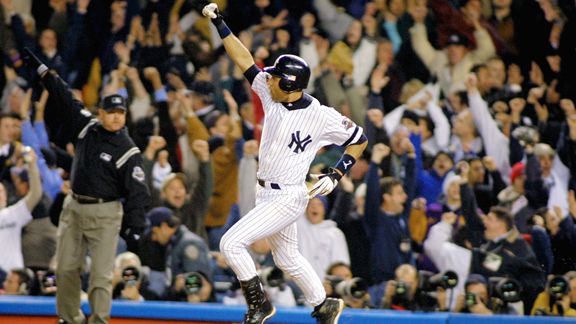One of my first memories is from 2001. I was five years old, and it was just a couple of months after 9/11. I was watching the New York Yankees play the Arizona Diamondbacks in Game 4 of the World Series. In the bottom of the 10th inning, with the score tied 3-3, Derek Jeter came up to bat right as the clock struck midnight on November 1st. After a nine-pitch at-bat, Jeter sent a 3-2 pitch sailing into the right field stands. He was Mr. November, the Yankees won the game, and my family room was sent into hysterics.
Despite its longtime status as America’s national pastime, baseball has faded in popularity over the past decade. The World Series, the sport’s premier event, has steadily declined in ratings over the past ten years, despite a brief uptick during the most recent Mets-Royals contest. Baseball games are also getting longer, with the average game length clocking in at 3.13 hours in 2014. If you want any indication that football has supplanted it as America’s favorite sport, just look to the fact that a regular season Sunday Night Football game had higher ratings than Game 5 of the World Series in 2015.
What is to blame for this paradigm shift in America’s taste in sports? I argue that this is not a recent development, but rather a long-standing tendency of mass cultural preference that traces its roots back to the popular Roman concept of “Bread and Circuses.”
Today, we may not have lions or gladiators, but we do have athletes inflicting copious amounts of pain on each other. After all, football’s primary appeal lies in its cathartic qualities. Most viewers do not know what it means to run an Air Coryell system, or what a Cover-2 defense entails, but watching a brutal tackle or violent hit is extremely satisfying, whether or not the viewer wants to admit it. I am certainly as guilty of this as anyone: as much as I like to claim I watch football for the chess match between coaches, there is something incredibly appealing in watching 300-pound men beat each other up every play.
That is not to say that baseball holds a moral high ground over football. Indeed, quite the opposite: baseball’s record is far from spotless. As much as baseball purists and the modern-day MLB would like to sweep the steroid era under the rug, the fact is the steroid era saved baseball in many ways. At the end of the 1980s, interest in baseball had dropped quite significantly. Players turned to doping to try to give themselves an edge. Team and league officials were more than willing to turn a blind eye.
The American people loved watching baseball during this time: baseball games were exciting; high-scoring affairs, and home-run races between Sammy Sosa and Mark McGuire transfixed the nation. It was not just the hitting that was more exciting. Pitchers improved their performances as well to keep pace with ‘roided-up hitters. More than that, pitchers had character. The Yankees’ Roger Clemens was never afraid to throw at opposing batters to send a message, Red Sox ace Curt Schilling regularly engaged in smack talk before big games, and his teammate Pedro Martinez became the most hated man in all of New York when he threw Yankee hitting coach Don Zimmer to the ground during the 2003 ALCS. Baseball was highly entertaining, both on and off the field. Low-budget teams like the Oakland Athletics had to turn to unconventional methods to keep pace with financial juggernauts. Wherever you looked, there was a storyline.
What happened to that excitement? The steroid era unofficially ended in 2005 with the BALCO scandal. The excitement was gone. I watched as several of my formerly favorite players, like Andy Pettite, Roger Clemens, and Alex Rodriguez came under fire for doping. My initial reaction was that it had forever tainted the game, but I soon realized that the issue was slightly more nuanced. Those legends of baseball were taken down by moral crusaders who sought to clean up the game by villainizing players who had been put under a tremendous amount of pressure to succeed.
This article is not to excuse the use of steroids, but rather to offer a rationale for their use and an explanation for baseball’s explosion and subsequent decline in popularity. As hitters quieted down, pitchers became the focus. It was once considered unusual for a team to have an elite pitcher; now it is considered unusual if a team does not have an elite pitcher. The game became, for lack of a better term, boring. With this perceived boredom in mind, audiences turned back to football.
Even if football is capturing the nation’s attention and winning the ratings battle, the negative PR the NFL has had to battle will undoubtedly force changes to the league to protect players. This is certainly a good move. I, as a long time New York Jets fan, find myself unable to fully enjoy football games (not just because the Jets break my heart every season) with the knowledge of the physiological impacts on players.
As football becomes safer, will it lose popularity? Probably not. The presence of the Super Bowl will keep people at least somewhat interested in the regular season, and the fact that there are only 16 games every year (not including playoffs) makes following a team for the regular season extremely easy. It has become more difficult to follow baseball teams with a similar devoutness, as the 162-game marathon that is the regular season makes it easy to fade in and out of keeping track of how your favorite team is doing.
Baseball risks falling into complete irrelevance unless the MLB can figure out a way to speed up games, and football must establish how to protect players without compromising the core appeal of the game, if that is possible. What is clear is that mass audiences will flock to whatever sport offers the simplest entertainment and most compelling off-field storylines. Although Derek Jeter may be gone, I will hopefully be able to enjoy many more Yankee World Series titles. But what do I know? I’m still just the kid sitting on the couch cheering for Jeter.





